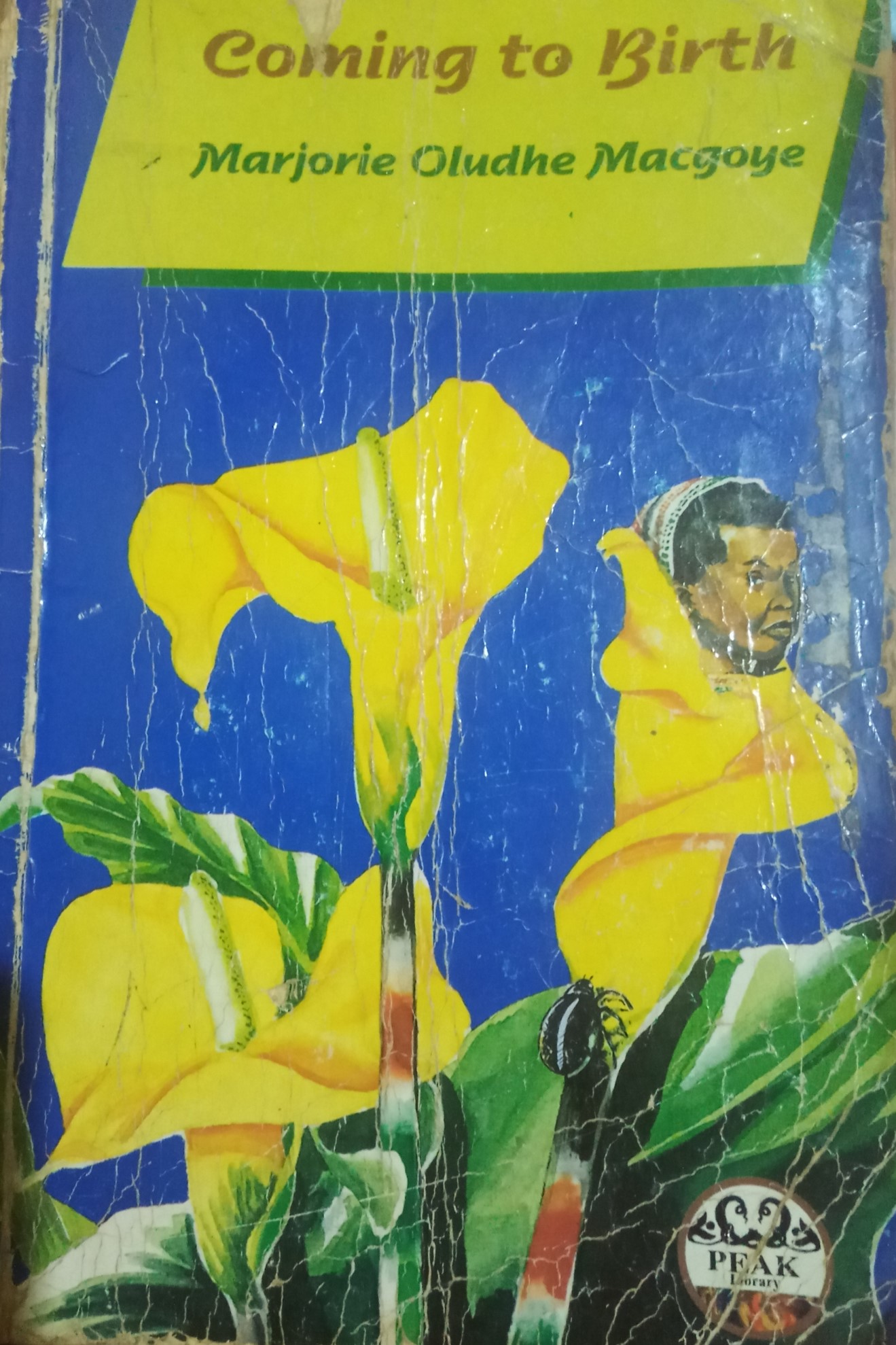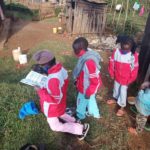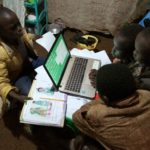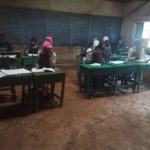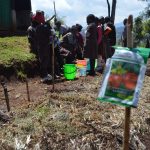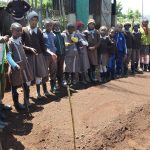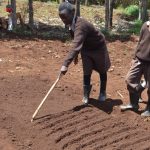Coming to Birth was first published in 1986, written by Marjorie Oludhe Macgoye. Marjorie was a British Kenyan who settled in Kenya and integrated among Luo community in the country, like Ngũgĩ wa Thiong’o’s work Marjorie’s work is among the celebrated literature in Kenya and Africa in general, her books are among those that are obligatory in Kenya’s school curriculum.
Plot of the Coming to Birth
The storyline in the novel begin with Martin Were preparing to meet his wife Paulina. Martin and his wife were young married couple reflecting the country Kenya also being young then. From the novel (page 1),the author clearly state that it was 1956, six years before Kenya attain self rule from Britain. The political narratives from pre-independent to post-independent Kenya revolves around these two main characters, Martin and his wife Paulina. Their lives changes a lot in the course of the novel and so is the political scenario in the country. Martin belongs to the working-class where he is employed in a shop to sell envelopes. Paulina is portrayed as naïve girl from rural at the time, who later went on to transform herself to an independent woman.
The first line of the novel introduces audience to Martin Were who is young educated middle class in the Kenyan society then. Martin is depicted as ‘successful’ young man. Paulina who is around sixteen years of age is introduced at the beginning of the novel and depicted as naïve and ignorant girl to the ways of the city. The storyline of this novel follows the life of this young couple who goes up and down of marital life, childlessness here is playing a role of even domestic violence where Martin beat up Paulina for minor mistakes like getting lost in the city and imagining things.
Their love affections doesn’t come out during their dialogue, neither Paulina nor Martin openly expresses their affection to each other, however, through spontaneous acts of kindness as seen from Martin to Paulina, reveals the presence of love. At the beginning of the novel, their love is ‘young and innocent’. But as the time progressed their love is put on a test.
The couple faces the challenge of childlessness as well political assassinations taking place in the country with major political figures like Argwing Kodhek and Tom Mboya being assassinated. The marriage fails to work as Paulina failed to sustain pregnancy in full term when she experienced several miscarriages. Martin became frustrated by his wife’s numerous yet unsuccessful attempts to sire a child. They finally separate and Martin started engaging with other women.
In the course of separation between the two, each attempted to have child from their new found partners. Paulina get a child with a married man, Simon, and she named the child Okeyo. The naming of the child is attributed to her commitment she had with Martin. Due to political chaos in the country then, brought about by bitterness from political assassinations and detaining of rival political leaders, Okeyo is killed during political protests in Kisumu. In his side, Martin fails to sire a child with other ladies.
Paulina and Martin would later come to end their separation and come back together. In this level Paulina is no longer a naïve as depicted in the start of the novel and Martin is no longer the confident and ‘in control man’ who was depicted at the beginning of the novel. Their marital ups and downs have taught them on how to maneuver and became different individuals. Through her experience as community leader and being helper of MP’s family, Mr and Mrs M, Paulina is empowered and able to voice her stand. Martin seems passive to the political and social events around him, a near state of disillusionment. The hope of achieving the true meaning of freedom in independent Kenya is finally ‘Coming to Birth’, people have hope that there is coming a new wave of leadership.
The events in the novel turn better when Paulina inform Martin of her pregnancy. She is pregnant with Martin and she is happy about it, however, her past miscarriages prevent her to have full joy. She caution Martin about being overjoyed on the account of previous miscarriages, but she expresses her optimism of a promising future.
Politically, Kenya is ‘Coming to Birth’ with the experience of political stability. The marriage between Martin and Paulina seems to stabilize after bumpy experiences. Symbolically, the author offers hope for politically stable and peaceful Kenya as portrayed by Martin and Paulina.
Review of the novel
The author of the novel Marjorie Oludhe Macgoye skillfully narrates the events surrounding Martin and Paulina of marriage with that of Kenya as young developing country. The struggle that Martin and Paulina goes through, mainly of trying to have a child, gives an impressions of the disillusionment faced by many Kenyans in the hope that they will enjoy their new found freedom in the country.
The hopelessness and despair seen the relationship between Martin and Paulina is similar to that of prevailing politics in the country. The citizens seemingly not satisfied with what they were getting, its like, this is not what they were fighting for, and neo-colonialism is most likely took center stage in Kenya, as young independent nation.
When Martin reconciled with Paulina and nurtured the hope of having a child together, so is Marjorie shows the possibility of citizens experiencing the reality of freedom in their country.
The employment of imagery and ideas that are relative to the African experiences lays the foundation for the success of Marjorie’s work. Its a masterpiece, skillfully written to communicate the author’s thoughts and experiences concerning culture, politics, and influence of cultural traditions.
Figures of speech used in the Coming to Birth
- Personification
The attribution of a personal nature or human characteristics to something non-human, or the representation of an abstract quality in human form.
In the Coming to Birth , when Paulina was travelling to Nairobi to meet her husband Martin, the train is given human qualities “The train swept.”
“Rushing traffic” is personified when the author tried to explain the activities in the city.
More personifications are used in the novel.
- Similes
A figure of speech involving the comparison of one thing with another, a thing of different kind, used to make description more emphatic or vivid using “like”
Although the author has not used many similes in the novel, there are instances where she used tribalism remarks (page 33) to indicate how Kikuyu are industrious, she was comparing Paulina’s hardworking abilities to those of Kikuyu.
- Alliteration
Alliteration is a literary device that reflects repetition in two or more nearby words of initial consonant sounds.
In the novel Coming to Birth, Marjorie describes the life of Nairobi using alliteration “hustle and bustle”
The writer also describes the calf in the Martin’s home compound using alliteration, “…………sickly calf”
When Fatima was teasing Paulina, the writer described the sound as “….sickly sweet smell.”
There are more instances where the author used alliteration in the novel.
- Synecdoche
Synecdoche is a figure of speech in which a part of something is used to signify the whole or vice-versa.
When Paulina was discharged from the hospital to give space for more cases wanting beds, one Luo attendant sympathizes with her that she will get lost in the city and she better wait till her people come. “Paulina is trained to take orders.”
When Paulina finally got lost in the city, the writer refers to how big the city is for Paulina to master for a short period of time “……….she had not learned the town capicity.”
“People were pouring down the road on foot or bicycle” meaning that people were busy walking to and fro around the city.
There are other many instances in the novel where the author uses synecdoche as figure of speech.
- Circumlocution
Circumlocution can be defined as an ambiguous or paradoxical way of expressing things, ideas or views.
The author in the book Coming to Birth describes the underlying potential in youngsters who could not have no other opportunities in life “…….The panache with which a teenage turnboy hurry out of a matatu or a country bus expending on those spectacular leaps and quite unnecessary delays energy which might more profitably have been used in the classroom or on the soccer field.” The writer also describe the woman’s life by”…..perhaps woman’s life was so arduous at bottom that only the most leisured and wealthy had time to cultivate the seeming spontaneous of style.”
There are other instances where the author used circumlocution in the novel to express her idea.
- Onomatopoeia
Onomatopoeia is defined as a word which imitates the natural sound of a thing.
When Paulina got lost from the hospital, she was “jopted awake by someone banging petrol cans.”
When Paulina asked a uniformed woman whether she knows Martin Were, she responded by shouting an ang’eyo MISTER MARTIN WERE…..she went ahead by mimicking her chiegini ah-i-i-i-nya.
“Clang of boot” is used when Police came to Paulin’s house searching during an emergency.
When Mzee Jomo Kenyatta was coming to Kisumu little Okeyo, Paulina’s son was crying ‘Bang, bang,-bang, bang…
There are many examples where the writer uses onomatopoeia as figure of speech.
- Dialogue
Dialogue is a discussion between two or more people or groups, especially one directed towards exploration of a particular subject or resolution of a problem. This is the most used figures of speech in this novel Coming to Birth, few examples will be listed here;
“Who are you?” she asked trembling.
“My name is Rachel Atieno. I live in the next house. I met Martin going to work and he said you had arrived, so I came to greet you.”
‘I am happy to have a Luo neighbour,’ faltered Paulina. ‘I thought I should be all alone.’
‘I was afraid to light the jiko,’ she whispered. ‘Yes, it is strange at first. And you know you must never light the charcoal here indoors without opening the windows: it can send you into faint.’
Themes in Coming to Birth
Male Chauvinism
Men are perceived as holding positions of influence in society. A place that a lady hold in the society is less privileged than the man.
Politics of Betrayal
The prevailing politics in the country lead to disillusioned citizens. The hope placed by the government initially has diminished leading to political assassinations.
Infidelity
Several characters including Martin, Paulina, Mr M and Simon are involved in extra marital unfaithfulness.
Feminism
Paulina, Chelagat and Mrs M are some of the women who stand in the novel. Their efforts results in the enhancement of women’s position in the novel.
Perseverance
Throughout the novel, Paulina shows perseverance. In the end she get what she wants, a child. She struggled to to be an independent woman. She overcomes numerous challenges. Martin too perseverance when he studies extra times to get promoted in the work.

